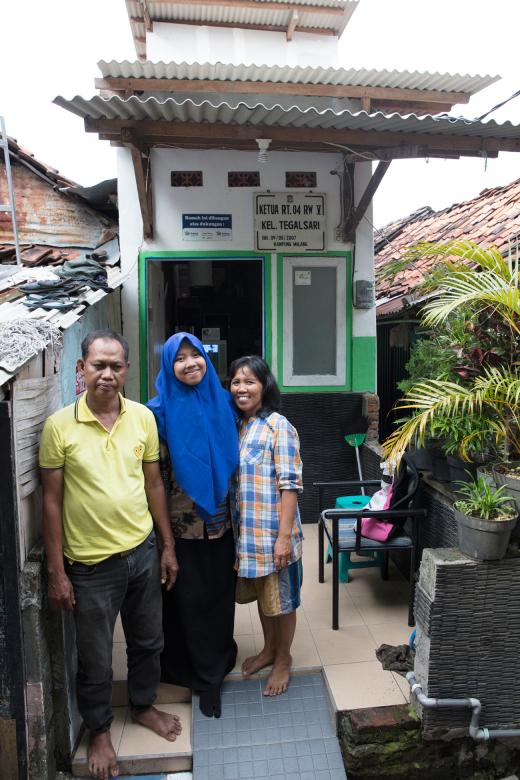A place to cultivate love
Sleeping with rats milling around them was a memory that Jumali and his wife Winarsih shuddered to recall. It was just over three years ago that the family of six huddled in a rental 6-square-meter hut with a leaky tin roof.
During the rainy season, water would come into the hut and Jumali and his family had to play “musical chairs” with their possessions. “Whenever it rained, we would be busy saving our things, especially my children’s books,” said Jumali, 54, a street food vendor. Jumali and his family of three live in Tegal Sari, a slum community in Surabaya city, western Indonesia.
The other reason for moving things around was the lack of space. The one-room hut served as the family bedroom, kitchen and living room. Much time was spent moving items outside the hut to create space for sleeping, cooking, eating, studying or receiving guests. “We often get flustered when there are guests, or when my children’s friends came over because there was no privacy. Sometimes we had to use the community center in front of my house, or go over to our neighbor’s house to receive guests,” said Winarsih, 50.
Although Jumali and Winarsih were well aware of the need for decent housing, they could neither afford to buy a plot of land nor to build a new house. When they learned that Habitat for Humanity Indonesia was starting an urban housing project in Tegal Sari, they jumped at the opportunity to apply. “When we were chosen, I felt very proud because that meant we were able to fulfill the criteria for Habitat’s assistance.”
Moreover, the promise of stability assured Jumali. Habitat Indonesia’s staff had explained to him that with security of land tenure, he and his family would not have to fear eviction. With their savings combined with a small loan from their youngest daughter’s scholarship fund, which they paid off after a few months, Jumali and Winarsih were able to buy a plot of land from the landlord.

(From left) Jumali, 54, his wife Winarsih, 50, and their daughter Diyah, 20, in front of their Habitat home in Tegal Sari, Surabaya, Indonesia. Jumali runs his own small business as a food seller, with the help of Winarsih who prepares the food from their home. Photo: Habitat for Humanity International/Ezra Millstein.
The couple contributed their own labor toward constructing their Habitat house. After moving into their two-room house in Tegal Sari, the effects of a healthier, more spacious home were immediately felt by their daughter Diyah. “I am getting better grades. I can learn more comfortably now. Previously, I had to study in the same space that my mother was cooking, or I had to move things around to make space for my books,” said Diyah, 20, who is on a teaching scholarship at the state university, Universitas Negeri Surabaya.
With a proper kitchen, Winarsih said she is more motivated to prepare food at home for Jumali to sell on the streets in the evening. “There are no more rats now. Our house is cleaner,” she said.
The sense of pride is also evident. “I feel very proud now that I own the land and the house. Our home is not only a place to shelter us from the rain and the heat. This is truly a place to cultivate love,” Jumali said.
Since 2014, Habitat for Humanity Indonesia has worked with more than 5,000 individuals to improve their lives through decent housing and/or clean water and safe sanitation with the support of Korean donors. Habitat Indonesia is also implementing a five-year community action plan. This includes rehabilitating the community’s drainage system, setting up a waste management system and renovating community centers, schools and community toilets. Training in waste management and maintaining a safe, healthy living environment will be provided. In addition, Habitat Indonesia has supported school repairs and greening programs in the community.
Find out more about Habitat’s work and our supporters through our e-newsletter, Asia-Pacific Update. Subscribe now.